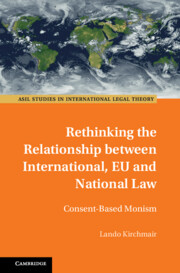Book contents
- Rethinking the Relationship between International, EU and National Law
- ASIL Studies in International Legal Theory
- Rethinking the Relationship between International, EU and National Law
- Copyright page
- Contents
- Figures and Tables
- Preface
- Acknowledgments
- Table of Cases
- Abbreviations
- Introduction
- Part I Common Theories on the Relationship of Legal Orders and Their Flaws Concerning the EU Legal Order
- Part II Consent-Based Monism
- 5 The Underlying Understanding of Law
- 6 The Theory of Consent-Based Monism
- Part III A Practical Application of Consent-Based Monism
- Conclusion
- Bibliography
- Index
5 - The Underlying Understanding of Law
from Part II - Consent-Based Monism
Published online by Cambridge University Press: 29 February 2024
- Rethinking the Relationship between International, EU and National Law
- ASIL Studies in International Legal Theory
- Rethinking the Relationship between International, EU and National Law
- Copyright page
- Contents
- Figures and Tables
- Preface
- Acknowledgments
- Table of Cases
- Abbreviations
- Introduction
- Part I Common Theories on the Relationship of Legal Orders and Their Flaws Concerning the EU Legal Order
- Part II Consent-Based Monism
- 5 The Underlying Understanding of Law
- 6 The Theory of Consent-Based Monism
- Part III A Practical Application of Consent-Based Monism
- Conclusion
- Bibliography
- Index
Summary
In order to analyze the relationship between international, EU and national law properly, this chapter establishes a working hypothesis: a common denominator of international, EU and national law. Analogous to the historical idea of social contract theory, this common denominator is consensus. After revisiting the major criticism of consent as a (moral) obligation to obey the law, the chapter elaborates on the moral duty to adhere to the pacta sunt servanda principle. After discussing the thesis of an innate Universal Moral Grammar (UMG) that relies on an analogy to the thesis of a universal grammar of the human faculty of language in linguistics, this chapter submits that Colwyn Trevarthen’s concept of primary, secondary and tertiary intersubjectivity is more suitable for conceptualizing the origins and development of the biological setup of human morality. This chapter refers to intersubjectivity, as the decisive concept to align morality and its development with core concepts of (developmental) psychology in order to lay bare the origins of moral normativity, which is essential for us as a basis for the pacta sunt servanda principle.
Keywords
- Type
- Chapter
- Information
- Rethinking the Relationship between International, EU and National LawConsent-Based Monism, pp. 115 - 174Publisher: Cambridge University PressPrint publication year: 2024

